
Skunk Removal - Professional Skunk Trapping Services
Welcome to SkunkPestControl.com! Skunks are not pests! They are a valuable part of our environment. However, if you have a conflict with a skunk, we want to help you resolve it in a humane and effective manner. This site is maintained by over 100 different professional wildlife control organizations across the United States. Our goal is to educate the public about human-skunk conflicts and provide solutions to skunk problems. Collectively, we service over 95% of the United States population. Click on our Locations page to find a wildlife rehabber or even a professional trained in humane techniques who can help in your city or town. You can also read the topics addressed on this website to learn more about how to resolve your specific skunk conflict. Feel free to call or email for help - we don't want to see any skunks hurt!
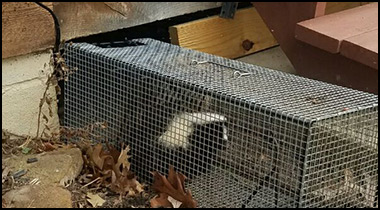
Skunk Trapping and Removal
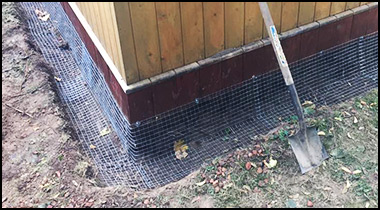
Preventative Repairs & Exclusion
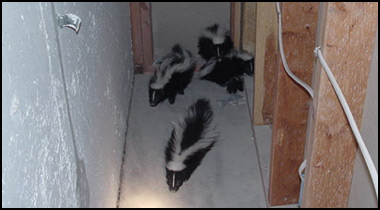
Skunk Removal From Structures
We give free advice via email and phone.
We have wildlife rehabbers in most US cities.
Call to discuss your skunk problem.
We offer free educational skunk seminars!
You can often do-it-yourself. Tactics include:
Do a thorough inspection of your property.
Prevention is always the best first step.
Perform humane skunk trapping and removal.
Use structural exclusion barriers to prevent entry.
Use boards for removal of skunks in window wells.
Call us for odor removal advice!
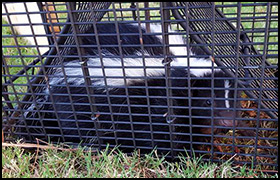
HUMANE SKUNK TRAPPING: It is better to avoid using a cage trap at all, if possible. Prevention is always better. But if you need to trap and relocate, best to specialize in safe, humane, spray-free skunk trapping and removal. Most of the time we use solid-walled traps, but sometimes cage traps are a better option. Wildlife trapping is a science - we employ several different traps depending on situation. From a lone skunk eating pet food, to a family of skunks living under your shed, we strive to effectively remove the target species only, without capture of stray cats or other animals. Often we are able to funnel the skunks out from under structures. Our knowledge of wildlife behavior ensures that the animals don't spray upon removal from your property. Our group maintains an active community of communication and attend seminars and training courses to ensure the best practices, and ensure up-to-date training. We provide skunk help in both residential and commercial services.
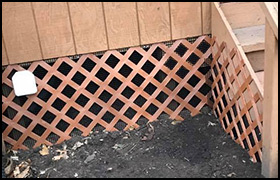
SKUNK PREVENTION & EXCLUSION: Skunks commonly set up a den under buildings, the most common of which are elevated homes, porches, sheds, decks, and even other architectural features like heating units. It is essential that the entire family is removed, and often part of the process involves blocking all entry/exit to the structure, and funneling the skunks out into a single trap or exclusion device. The most important step in the process, not just for skunks but for many species of wildlife that can live under your building, from groundhogs to raccoons to stray cats, is to install an exclusion barrier around the perimeter of the structure. Because many animals can burrow, you should dig a trench around the structure, and install a heavy steel mesh into the ground and bending outward, which the animals are unable to dig under. You can buy this at any hardware store, such as Home Depot. Affix the steel mesh to the structure with screws and washers, and you can add lattice work for visual appeal, to keep skunks out permanently.
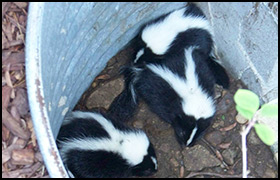
OTHER SKUNK PROBLEMS: Skunks often end up stuck in areas such as window wells or basements, which they can fall down, or inside garbage cans, or other areas. You can safely remove the animals without them spraying by placing a wooden board down the window well for them to climb out of. Or you can gently tip over a garbag can they are stuck inside. In the event that a skunk has already sprayed under your house, or even some other place, such as your car, it is a difficult situation. The best way to remove skunk odor is to use the proven recipe of mixing baking soda, hydrogen peroxide, and dish soap, and treating the smelly area. But under a house this is very hard! If you need dead skunk removal - often these animals will die under your structure, and the odor is very powerful - you just need to put on a mask and gloves and a garbage bag and get down and dirty and remove the animal! You might also want to install fencing of gardens, keeping pet food indoors, and other preventative techniques.
Skunks Are Good Animals!
The problem is not with the skunks, the problem is with your home and property! Skunks are good animals, and have lived here in the USA far longer than people. But human encroachment on their habitat
means that people and skunks interact and have conflicts. The problem often stems from features on your property. If skunks are living under your shed or porch, it's because it was built with an opening,
often around the entire perimeter, leading under the structure. All buildings should have barriers leading to the ground so that animals are not lured underneath seeking shelter. Furthermore, pet food or
garbage left outdoors will draw in wild animals such as skunks. Keep any tempting food indoors if you want to avoid wildlife conflicts. Similarly, if you have any crops that lure in skunks, a sturdy
fence can keep them at bay. There are no known effective skunk repellent products, such as sprays or granules, that will deter skunks. Nor will light or sound machines. But with some common sense and
the elimination of the property features that attract skunks, you can usually solve the problem, without the need to use cage traps, which are stressful to the animals, and often inhumane due to the
environmental difficulties involved with wildlife relocation.
Feel free to email us or call a local wildlife rehabber in your area, or a professional organization that specializes in humane human-wildlife conflict resolution.
City Animal Services and Wildlife Rehabilitation Resources:
CA Los Angeles Skunk Removal | CA San Diego Skunk Removal | CA San Francisco Skunk Removal | CO Denver Skunk Removal | GA Atlanta Skunk Removal | IL Chicago Skunk Removal | IN Indianapolis Skunk Removal | KS Kansas City Skunk Removal | MA Boston Skunk Removal | MD Baltimore Skunk Removal | MI Detroit Skunk Removal | MN Minneapolis Skunk Removal | MO St. Louis Skunk Removal | NC Charlotte Skunk Removal | NY Buffalo Skunk Removal | OH Cincinnati Skunk Removal | OH Cleveland Skunk Removal | PA Philadelphia Skunk Removal | PA Pittsburgh Skunk Removal | TX Dallas Skunk Removal | TX Houston Skunk Removal | TX San Antonio Skunk Removal | WI Milwaukee Skunk Removal | Washington DC Skunk Removal | ...and over 130 other US cities
Our Skunk Advice Articles
- Do It Yourself Skunk Removal
- Get Help Solving a Skunk Problem
- What are the problems that skunks cause?
- What kinds of damage do skunks cause?
- Prevention: How to Keep Skunks Away
- Skunk Trapping: How To catch a Skunk
- What equipment to trap a skunk?
- What is the best bait to trap a skunk?
- What to do with a skunk after I catch it?
- How to use one-way exclusion funnels
- Where should I relocate a trapped skunk?
- What are humane ways to kill a skunk?
- Is it legal for me to trap a skunk?
- How to Remove a Dead Skunk
- Photographs of Skunk Removal
- Do mothballs help repel skunks?
- How to get free skunk removal
- How to keep skunks out of my garden
- What are ways to kill a skunk in yard?
- Should I ever poison a skunk?
- Will a pest control company help?
- How to remove skunk odor
- How to remove a skunk in a house
- How to remove skunk smell from a car
- Why do skunks spray?
- Can a skunk spray more than once?
- Do skunks warn before spraying?
- Protect yourself from skunk spray
- Do skunks run out of spray?
- Do baby or juvenile skunks spray?
- What to do if I find a nest of baby skunks?
- Wildlife rehabilitation of skunks
- What diseases do skunks carry?
- Do all skunks have rabies?
- Is a skunk active during the daytime rabid?
- What are symptoms of a sick skunk?
- What does skunk feces look like?
- Are skunk feces dangerous to touch?
- Do skunks make good pets?
- What is a skunk's natural diet?
- Do skunks dig in lawns looking for food?
- What is a skunk's mating habits?
- Do skunks hibernate in the winter?
- How to identify skunk tracks
- Do skunks attack chickens?
- Do skunks attack humans?
- Are skunks dangerous to pets?
- Do skunks kill cats?
- Do skunks burrow underground?
- Why do skunks dig?
- Do skunks climb?
- Do skunks climb trees or live in trees?
- Do skunks fight each other?
- Do skunks come out during the day?
- Do skunks shed their fur?
- Do skunks swim?
- Where do skunks live?
- Why do skunks have a white stripe?
- Why a Humane Approach to Skunk Control
Skunk Information Article of the Month
Skunks are known to be scavengers and also predators of things like slugs or worms. They have small mouths, poor eyesight and clumsy feet. They are blamed for many things that they do not do. Skunks are known to eat eggs and they can also kill baby chicks. However, when you lose an adult chicken, then you should think about raccoons more than anything else. However, the skunks are opportunists and they can eat the chickens and pheasants that they can kill easily or more conveniently.
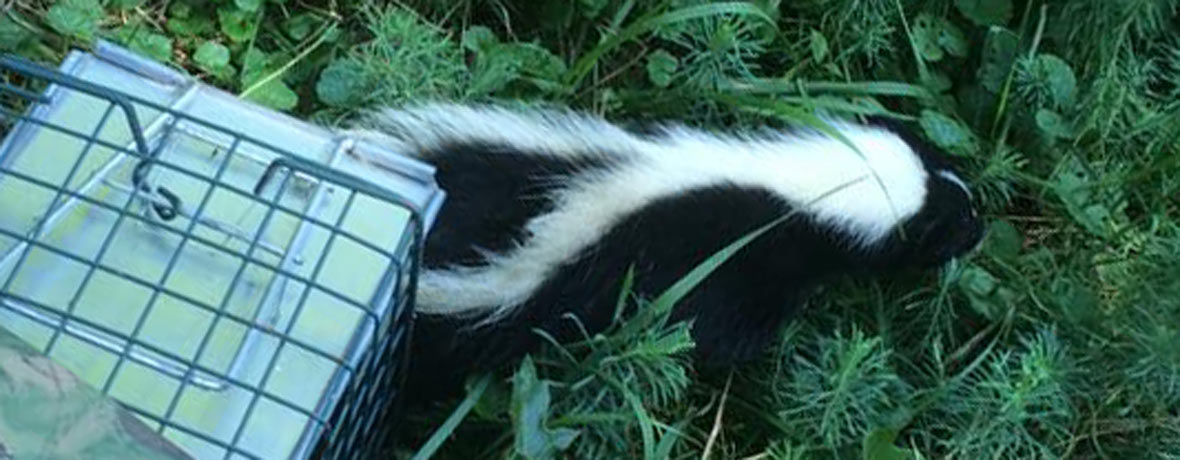
You will not be happy when you wake up and go to get the eggs only to find that the young chicks and the eggs are all gone and they have been eaten or destroyed by skunks. Since the skunks go out in the night, it is hard to catch them in the act of raiding the chickens. However, contrary to the raccoons, the skunks will not climb fencing and they will choose to dig under the fence in order to get the eggs of the chickens or their chicks.
To keep the skunk out, you will need chicken wire, a shovel and gloves. The chicken wire should be at least 3 feet tall and it has to be put around the entire chicken coop. The bottom of the chicken wire should be at least 2 feet underground in order to discourage the skunks from digging under wire fencing. You can bend the bottom 6 inches of the chicken wire out or away from the direction of a coop before you bury it underground. You have to discourage a skunk from trying to dig under a fence.


